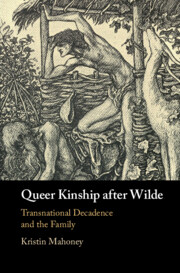Book contents
- Queer Kinship after Wilde
- Queer Kinship after Wilde
- Copyright page
- Contents
- Figures
- Acknowledgments
- Introduction
- Part I Queering Kinship/Kinship as Queer Politics
- Part II Queer Retreat and Cosmopolitan Community
- Part III Decadent Modernism and Eroticized Kinship
- Chapter 5 Richard Bruce Nugent’s “Geisha Man”
- Chapter 6 Hallowed Incest
- Notes
- References
- Index
Chapter 5 - Richard Bruce Nugent’s “Geisha Man”
Harlem Decadence, Multiraciality, and Incest Fantasy
from Part III - Decadent Modernism and Eroticized Kinship
Published online by Cambridge University Press: 15 September 2022
- Queer Kinship after Wilde
- Queer Kinship after Wilde
- Copyright page
- Contents
- Figures
- Acknowledgments
- Introduction
- Part I Queering Kinship/Kinship as Queer Politics
- Part II Queer Retreat and Cosmopolitan Community
- Part III Decadent Modernism and Eroticized Kinship
- Chapter 5 Richard Bruce Nugent’s “Geisha Man”
- Chapter 6 Hallowed Incest
- Notes
- References
- Index
Summary
Chapter Five turns to the Harlem Renaissance author and illustrator Richard Bruce Nugent, arguing that his “Geisha Man,” which centers on the erotic relationship between a white American father and his mixed-race child, should be understood as emerging from his sustained engagement with Decadence and the Salome story. I position this work within the framework of Nugent’s extensive experimentation with Decadence to argue that the text’s Orientalism and its preoccupation with incest should be understood as more than a simple echoing of Decadence’s more troubling tendencies. This content operates within the text in service to Nugent’s efforts to conceptualize mixed-race identity and the rupturing of Black kinship structures within the United States. Salome is for Nugent a story about a fetishized performer attempting to enact erotic agency within a system of fractured familial formations, and revising her story allows Nugent to theorize kinship and multiraciality in relationship to what Hortense Spillers refers to as the “losses” and “confusions” that accompanied the “dispersal of the historic African American domestic unit.” This chapter sheds light on the manner in which Orientalist Decadence was transported across the Atlantic to perform different types of service for Black thinkers in Harlem in the early-twentieth century.
- Type
- Chapter
- Information
- Queer Kinship after WildeTransnational Decadence and the Family, pp. 159 - 185Publisher: Cambridge University PressPrint publication year: 2022

